
The Fellowship Year
During their time in Cambridge, Nieman Fellows take classes at Harvard and MIT and participate in a broad range of Nieman activities including seminars, shop talks, workshops and master classes. They also present Soundings, weekly talks in which explore and explain why they do what they do as journalists.
Fellows also take classes designed exclusively for them, including narrative nonfiction writing taught by author Steve Almond, and an Op-Ed writing class taught by Jeffrey Seglin, director of the HKS Communications Program and a senior lecturer in public policy. In the spring, they learn about the book industry during an annual panel discussion with publishing executives and literary agents organized by author and 1994 Nieman Larry Tye.
Fellows moderate many of the official talks scheduled by Nieman during the year and organize DIYs, more causal events during which they teach their classmates new skills, collaborate on projects and meet with invited guests for informal discussions on a variety of subjects.
The Abrams Nieman Fellowships
The Abrams Nieman Fellowships for Local Investigative Journalism have offered reporters and editors from underserved areas the benefits of an academic-year fellowship, along with funding for fieldwork to develop investigative public service reporting projects at home. The Abrams Fellows have been supported by a grant from the Abrams Foundation.

Following her time at Harvard, Emily Corwin, a 2021 Abrams Nieman Fellow, began her investigation into the exploitative relationship between the criminal legal system and temporary staffing agencies. Forthcoming stories will illustrate the degrading nature of temp work; the ways temp agencies profit from workers’ employment barriers; and the fact that many firms receive significant federal tax credits meant to incentivize long-term employment and opportunities for growth. Her reporting is focused in the Kentuckiana region of the U.S.
Scott Dance, another 2021 Abrams Nieman Fellow, has launched a series on climate change in The Baltimore Sun. It includes reporting that came out his Abrams fieldwork, examining sea level rise and the many ways climate change is affecting vulnerable communities and investigating the consequences and ripple effects for local residents, businesses and governments.
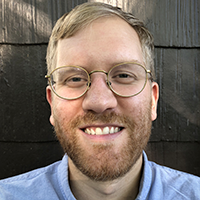
Johnny Kauffman, a 2020 Abrams Nieman Fellow, reported on threats to democracy and the consequences of disinformation in the state of Georgia. During the 2020 election cycle, for his fieldwork, Kauffman spent months inside the embattled Fulton County elections department, where workers were targeted as part of a campaign by former President Donald Trump and his allies to overturn the election results. Kauffman’s stories appeared on WABE(Atlanta’s NPR station), “This American Life,” The Guardian and Atlanta Magazine. He is currently working as a senior producer at Campside Media.
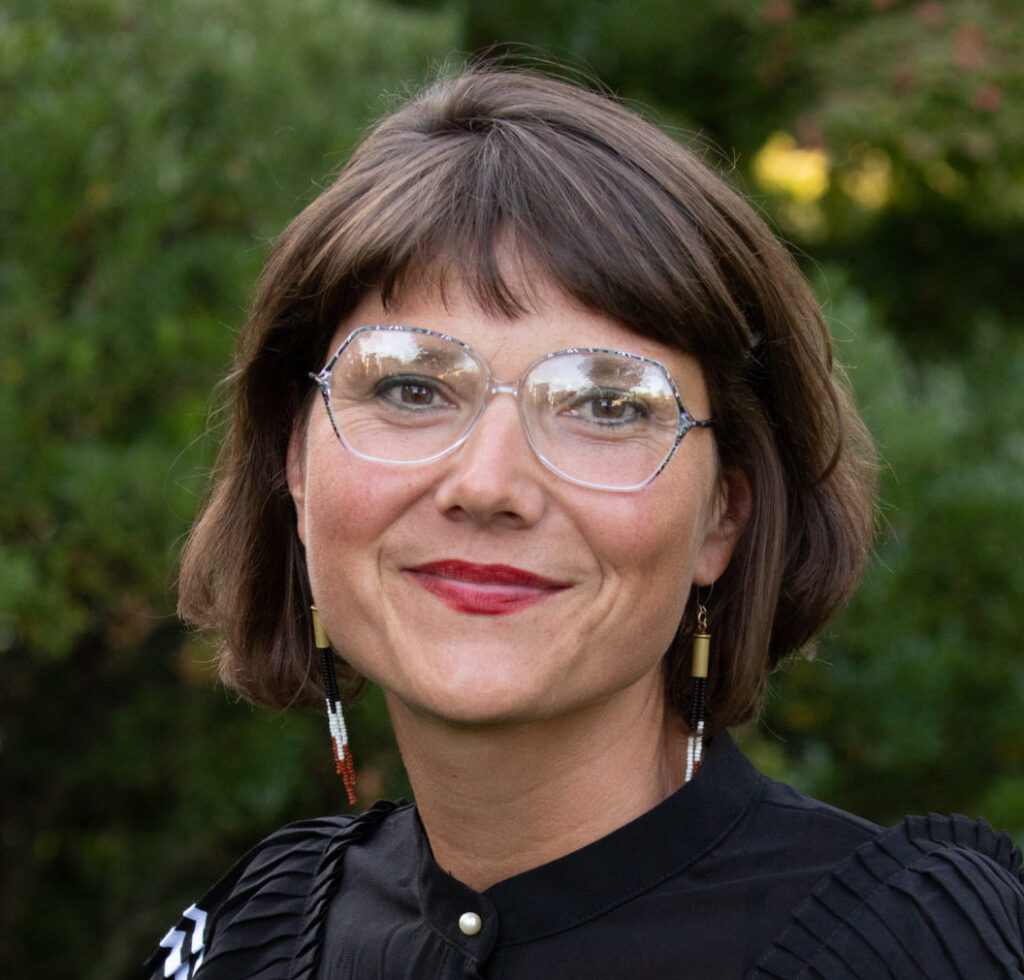
Tennessee Watson, a 2020 Abrams Nieman Fellow for Local Investigative Journalism and a reporter for Wyoming Public Radio conducted fieldwork on the juvenile justice system and why some states lock up kids at twice the national average. Her own state, Wyoming, tops the list. Watson contributed to an APM Reports investigation into abuse and mistreatment in juvenile facilities owned by Sequel Youth and Family Services. She also reported on the Sequel facility in Wyoming and following her coverage, that operation was closed. She followed up by reporting on how that move would impact kids placed there.
Watson additionally worked with Reveal and artist Eda Uzunlar to create a comic about juvenile justice called “Since when is being a teenager a crime?” and she is finishing a three-part series for the Modern West podcast on juvenile justice and Western attitudes toward struggling kids. In March, she moderated a panel discussion hosted by Wyoming Public Radio & Media and the Wyoming Afterschool Alliance that examined “New Directions for Youth Justice.” In October, she wrote “Revealing the Failures of the Juvenile Justice System” for Nieman Reports.

Matthew Dolan, another 2020 Abrams Nieman fellow, is the investigative editor of the Detroit Free Press, where in 2021, he oversaw local investigative projects on the role of race for those charged with resisting police; thousands of homeowners locked out of eviction relief; a problematic effort at privatization in mental health services; and a quick-turn recreation of the nation’s worst school shooting since 2018. Dolan is continuing his Abrams fieldwork on his own investigative coverage of the automotive world, focusing on health and safety issues and what they mean for the future of the bedrock industry for his home state of Michigan, with stories expected early in 2022.
Giving Back
Each year, fellows share their expertise with the Harvard community, lecturing in classes, participating in panel discussions, mentoring student journalists at The Harvard Crimson and much more.
Robert Frederick, the digital managing editor of American Scientist, and Austin Bogues, a reporter for the Asbury Park Press (who joined USA Today as a commentary editor after his Nieman Fellowship), spoke with the students at the Harvard Political Review.
In February, Bogues, along with classmate Yasmin Amer, a reporter and producer for WBUR, and Nieman staff writer Hanaa’ Tameez talked to student journalists at the Cambridge Rindge and Latin School about getting started in journalism.
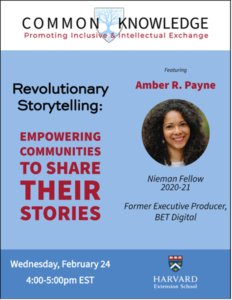
Also in February, Amber Payne, former executive producer for BET, spoke about inclusive storytelling at a Harvard Extension School as part of a new speaker series, “Common Knowledge: Promoting Inclusive and Intellectual Exchange.” During her talk, “Revolutionary Storytelling: Empowering Communities to Share Their Stories,” she discussed her career as a broadcast producer, multimedia journalist and host, and led a discussion on how to bring inclusive storytelling into newsrooms and communities.
Payne also spoke to students in Harvard’s Adams House about her work in journalism. After her fellowship ended, she joined The Emancipator as co-editor in chief. The project, a partnership between Boston University’s Center for Antiracist Research and the Boston Globe’s Opinion team, aims to reframe the national conversation on racial justice.

In March, John Archibald, a columnist for the Alabama Media Group, spoke in a virtual event sponsored by the Harvard Book Store about his book “Shaking the Gates of Hell: A Search for Family and Truth in the Wake of the Civil Rights Revolution.” Comedian and activist Roy Wood Jr. moderated the talk, one of a number of events that Archibald participated in to discuss his findings.
In April, Willoughby Mariano an investigative reporter for The Atlanta Journal-Constitution, spoke to a class at Harvard Law School about her work. In May, she participated in the PEN America panel “Keeping It Local: Community Reporters Elevating Civil Discourse.”
In May, Marc-Olivier Bherer, a staff editor and reporter for the Ideas-Debates section of the French daily Le Monde, hosted the seminar “Emmanuel Macron’s Presidency and the 2022 French Presidential Election” at the Center for European Studies.
During the summer, WBUR producer Yasmin Amer, Emily Corwin, an investigative reporter and editor for Vermont Public Radio, and incoming 2022 Nieman Fellow Jorge Caraballo Cordovez, growth editor at “Radio Ambulante,” NPR’s only podcast in Spanish, participated in an audio journalism panel organized by The Harvard Crimson for its Summer Journalism Academy.
Jim Urquhart a Colorado-based photographer, and 2022 Nieman classmate Gabrielle Schonder, a producer and reporter for “Frontline,” spoke with students at the Harvard Political Review about their work. Urquhart, along with Nieman classmates Natalia Viana and Toronto-based journalist Pacinthe Mattar, additionally each met with a group of HPR students as part of the publication’s mentoring program for aspiring journalists.

In October, Urquhart gave a lecture in his history of fascism class on his work covering extremism, hate groups and anti-government militias. He was one of four Niemans (along with Hannah Allam, NF ’09, Andrew Sussman, NF ’01, and Walter Ray Watson Jr. NF ’08) who received a 2021 National Headliner Award for their coverage of extremism on NPR. Their “Profiles in Extremism” won first place in the broadcast radio networks and syndicators’ news series category.
Also in October, Felice León, a video producer and presenter at The Root, moderated a conversation following a film screening of the dance film “Initiation – In Love Solidarity” for the Harvard Dance Center.

A number of Niemans worked on teams that won 2020 news and documentary Emmy Awards: Gabrielle Schonder, NF ’22, was the producer for “Love, Life & the Virus” a “Frontline” documentary that won for best story in a newsmagazine. It follows a pregnant COVID-19 patient through an emergency delivery and her struggle to stay alive. Dave Mayers, NF ’22, a producer and cinematographer with Vice TV’s “Vice News Tonight,” which won for outstanding newscast. Susie Banikarim, NF ’14, was executive producer of the program until earlier this year. Mayers and Banikarim also worked on “American Uprising,” a story about the George Floyd protests in Minneapolis, which won for outstanding coverage of a breaking news story in a newscast.
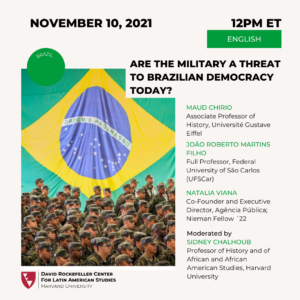
In November, Natalia Viana, co-founder and executive director of Agência Pública, Brazil’s first nonprofit investigative journalism outlet (and a finalist for an ONA’s Online Journalism Award), took part a discussion organized by the David Rockefeller Center for Latin American Studies about the growing role of the military in politics in Brazil and what it means for the country’s democracy. In her latest book “Dano Colateral,” Viana recounts the key events leading to the military’s prominence in Brazilian politics 30 years after the end of the military regime, and the “collateral damage” that the use of the military in public security operations has caused. The book has been selected for a Journalism Human Rights Award in Brazil.
In June, shortly before she moved to Cambridge for her Nieman Fellowship, Viana became president of the newly launched Brazilian Digital Journalism Association (Ajor), which comprises 30 innovative, independent online journalism organizations committed to diversity and democracy.
An Op-Ed Viana wrote for a course she took at Harvard Kennedy School taught by Professor Greg Harris “The Joy and Pain of Disconnection” was published in the online magazine Pangyrus.

Three 2022 Nieman fellows including Viana, Reuben Fischer-Baum, an editor who leads a team of graphics reporters at The Washington Post, and Caelainn Barr, the data projects editor at The Guardian in London, were among the more than 600 journalists who contributed to the Pandora Papers, the largest international investigation in journalism history. The project exposed a shadow financial system that benefits the world’s most rich and powerful. Other Nieman journalists who contributed to the series include:
- Brazil: Fernando Rodrigues, NF ’08, Poder 360
- Colombia: Carlos Eduardo Huertas, NF ’12, El Espectador/CONNECTAS
- Costa Rica: Giannina Segnini, NF ’02, Centro Latinoamericano de Investigación Periodística (CLIP)
- Ecuador: Mónica Almeida, NF ’09, Diario El Universo
- Germany: Frederik Obermaier, NF ’18, Süddeutsche Zeitung
- Hungary: Andras Petho, NF ’20, Direkt36
- Indonesia: Wahyu Dhyatmika, NF ’15, Tempo
- Peru: Gustavo Gorriti, NF ’86, IDL-Reporteros
- United States: Souad Mekhennet, NF ’13, The Washington Post; and David Barboza, 2016 Visiting Fellow, The Wire China
- United States / Israel: Uri Blau, NF ’14, Shomrim
In November, Jorge Caraballo Cordovez of NPR’s “Radio Ambulante” spoke to high school students about “Alternative Storytelling in Journalism” as part of The Harvard Crimson’s journalism webinar series.
Contributions to Nieman Reports by 2021-2022 Fellows
- In India, the Last Few Bastions Of The Free Press Stand Guard Against Rising Authoritarianism
Over the last seven years, newsrooms have found themselves in the trenches, holding the Modi government to account
By Vidya Krishnan, NF ’21, an India-based investigative journalist and author - The Real Meaning of “He’s No Angel” for Journalism
Why an artist’s angelic rendering of George Floyd could help change the way journalists describe victims of police violence
By Austin Bogues, NF ’21, currently a commentary editor at USA Today, formerly a reporter for the Asbury Park Press, - In Polarized Times, Local Papers Need to Lean Even Harder into Tough Issues
Local newsrooms should report with nuance, grace, and empathy — especially when covering political hot-button issues
By Austin Bogues, NF ’21 - The Old Normal Is Not the Normal Journalism Needs
The opening of newsrooms is filled with hope and fear. But we need human contact to feel human, and we need to feel human to report the stories of humanity
By John Archibald, NF ’21, a columnist for the Alabama Media Group - For Visual Journalists, The Pandemic Was Creative Inspiration to Try Harder
At the Minneapolis Star Tribune, photographers and videographers didn’t flinch from showing what was happening, but they also portrayed subjects in their full humanity
By Deb Pastner, NF ’22, director of photo and multimedia at the Star Tribune in Minneapolis - Holding On to Hope that News Coverage Leads to Change
Jasmine Brown reflects on maintaining her faith in journalism through the struggles of the past year.
By Jasmine Brown, a 2020 Nieman Fellow, 2021 Visiting Fellow and a senior producer in the race and culture unit at ABC News’ “World News Tonight with David Muir” - Upending the Journalism We’ve Always Done to Better Serve Communities
With URL Media, S. Mitra Kalita seeks to elevate Black and brown media organizations.
By S. Mitra Kalita, a 2021 Nieman Visiting Fellow, founder and publisher of Epicenter and co-founder of URL Media - Post-Covid, Newsrooms Should Cover What’s Going Right in Indian Country, Too
The mainstream press covered Indian Country at its worst. Its Covid-19 recovery is just as newsworthy
By Kyle Edwards, a 2021 Visiting Fellow, managing editor of Native News Online
Soundings
Throughout the academic year, Nieman Fellows take turns explaining why and how they do their work as journalists. Some highlights from 2021:
- Redefining What It Means to Cover War
Reporting on not just war but “people’s extraordinary bravery [and] their creativity in the face of complete devastation”
By Alissa J. Rubin, NF ’21, an international correspondent and senior writer for The New York Times who previously served as bureau chief in Baghdad, Paris and Kabul - “Journalists Make Me Better”
Journalists stand for truth, integrity and for those who can’t stand for themselves. When I think the work can’t matter, they show me it does
By John Archibald, NF ’21, a columnist for the Alabama Media Group - Beyond Superheroes Vs. Villains
Journalists must play a role in bridging the divides in our political discourse
By Austin Bogues, NF ’21, currently a commentary editor at USA Today, formerly a reporter for the Asbury Park Press - Journalism Helped Me Regain Power Over My Own Story
Finding meaning, agency, and purpose in reporting from my home country of Venezuela
By Patricia Laya, NF ’22, Venezuela bureau chief for Bloomberg News
Nieman Visiting Fellows
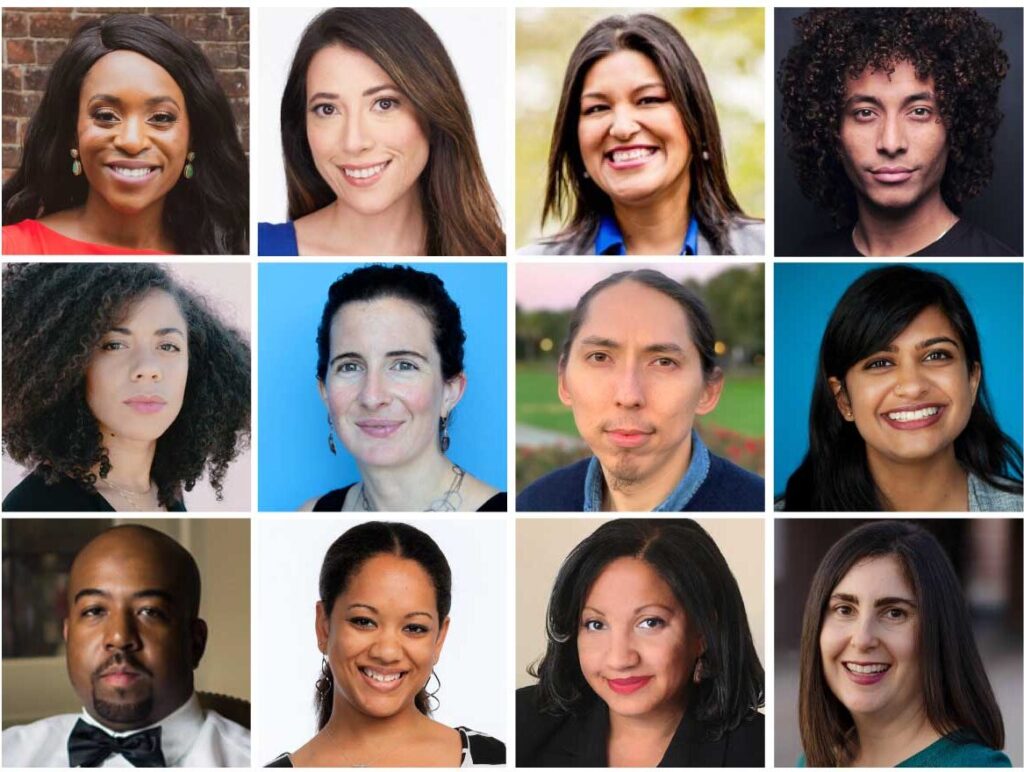
The 2021 Nieman Visiting Fellows
In response to dual crises facing the nation—a pandemic and racial injustice—the Nieman Foundation for Journalism at Harvard selected 12 innovative media professionals for focused project work as 2021 Nieman Visiting Fellows. Representing a broad range of communities and media outlets, the fellows worked remotely, using resources at Nieman and Harvard University to develop projects advancing racial justice or improving public health journalism in the U.S.
The 2021 Visiting Nieman Fellows and their study plans:
Janet Alvarez, deputy business editor of The Philadelphia Inquirer and a television contributor for CNBC and Telemundo, worked on developing widespread COVID-19 vaccination education initiatives to inform people of color when vaccines are distributed. Her goal was to assist vulnerable populations, especially the undocumented, who may be reluctant or find it difficult to be vaccinated.
@janetonthemoney
Tamara Best, a member of the news team at Facebook, researched how a centralized hub within a social media platform can be utilized to amplify the stories of an underrepresented community and create avenues for civic engagement to advance racial justice.
@_tamarabest
Jasmine Brown, a senior producer in the race and culture unit at ABC News’ “World News Tonight with David Muir,” worked to expand and amplify the voices of people of color in U.S. newsrooms by developing two crowd-sourced databases for Diversifying Journalism. Brown created the project together with her 2020 Nieman Fellow colleagues Ana Campoy, deputy economics editor at Quartz, and Selymar Colón, president and editor-in-chief of Frame ONE Strategies and former news executive at Univision News. Their first database includes experts on a variety of topics that will help reporters on deadline quickly find diverse sources. The second is a directory of newsroom staff that can be shared with hiring managers.
@JasmineLBrown (with partners @ana_campoy_ and @SelyColon)
Aaron Eaton, a digital coordinator and video producer at The Philadelphia Tribune, studied and reported on the impact that virtual learning has on low-income students with limited or no access to resources in the School District of Philadelphia.
@_AaronEaton
Kyle Edwards, managing editor for Native News Online, worked to examine, catalog and memorialize the loss of Indigenous elders, knowledge and culture during the COVID-19 pandemic by creating a website devoted to sharing oral histories and interviews with families affected by the disease. This will inform a podcast series focused on individual stories of Indigenous resilience in the face of the COVID-19 surge.
@kylejeddie
Valeria Fernández, an independent investigative journalist, worked with journalist Maritza L. Félix to co-create a Spanish-language podcast and outreach project “Comadres al Aire” (“Comadres on the Air”) that addresses women’s health issues (including those of queer, trans and non-binary people) in Latinx immigrant communities in the U.S. The initiative tackles the health inequalities that have become increasingly evident during the COVID-19 pandemic and reach those who don’t have internet access or can’t read. In July, Fernández was named interim managing editor of palabra. a digital news outlet created for NAHJ freelance members who cover stories and communities overlooked by larger news outlets. “Comadres al Aire” received funding from International Women’s Media Foundation (IWMF) to cover costs for the first season as well as production costs for or Season 2.
@valfernandez
Sarah Glover, formerly manager of social media strategy for NBC Owned Television Stations, created SPARK, an open-source project that will develop actionable diversity, equity and inclusion proposals for the journalism industry. She plans to publish a series of articles to provide news leaders with business strategies that focus on dismantling bias and promote inclusive news content. She additionally will present workforce solutions and training initiatives. Glover was named managing editor of Minnesota Public Radio in April 2021.
@sarah4nabj
Alice Goldfarb, who leads the COVID Racial Data Tracker for The COVID Tracking Project at The Atlantic, researched and developed guidance for analyzing and reporting on demographic data about public health, with a focus on COVID-19 race and ethnicity data.
@afgoldfarb
S. Mitra Kalita, founder and publisher of several niche newsletters, including Epicenter-NYC, which was created to help New Yorkers get through the COVID-19 pandemic, worked with Black and Brown community media to create a content-sharing and revenue-generating network. The initiative will help journalists of color work together to amplify their stories, both via each other and social platforms, and syndicate them to mainstream media outlets. Kalita’s new venture, URL Media, is the recipient of a new grant from the Archewell Foundation. Founded by the Duke and Duchess of Sussex, the nonprofit foundation supports groups around the world that are working for positive systemic change.
@mitrakalita
Bethany Mollenkof, a photographer and filmmaker, created a photo series documenting the toll COVID-19 is taking on Black life in the rural South, where Black people are contracting the virus at a higher rate and dying from it more often than others elsewhere. Mollenkof worked with STAT to document health inequities exacerbated by the pandemic in the rural South. She uses her photography to tell complex stories about race, class, and access to health care in underserved communities.
@FancyBethany (Instagram)
Jonathan Rabb, CEO/founder of Watch The Yard, a digital platform for Black college students and alumni, will examine the ways in which minority-owned news outlets are affected by loss of ad revenue due to the COVID-19 pandemic. He will explore new revenue models that these platforms can implement to continue essential journalism by, about and for underrepresented communities. Rabb was accepted for a full academic-year Nieman Fellowship and is a member of the Nieman class of 2022. He is now examining the use of virtual reality for journalism, with a focus on creating ethical and inclusive practices when using 360-degree video technologies to cover marginalized groups.
@jonathanrabb
Anjuli Sastry, an audio producer for the NPR podcast and national radio show “It’s Been a Minute with Sam Sanders,” crafted a two-pronged approach to increase diversity within public radio. On air, she launched “Where We Come From,” a new audio project to elevate voices of color across NPR radio shows, podcasts and visual platforms. As creator and producer of the audio and video series, she invited immigrant communities of color to tell their own stories through oral histories and intergenerational conversations with family, friends and experts — and answer the question “Where are you really from?” Behind the scenes, Sastry created a model for mentorship programs that foster retention and support employees of color throughout public radio.
@AnjuliSastry
Due to pandemic complications, Wendy Lu, a 2020 Visiting Fellow who works as an editor, reporter and producer at HuffPost and contributing writer at The New York Times, completed her research in 2021. She developed a curriculum of professional reporting workshops designed to educate reporters on how to cover disability issues and train newsrooms to be more inclusive of disabled journalists. Forbes named Lu to its 30 Under 30 media list for 2021. In December, Columbia Journalism School selected Lu as one of its 2022 Alumni Award winners.
@wendyluwrites
Arizona-based journalist and 2020 Visiting Nieman Fellow Amy Silverman’s project Wordslaw continues the work she started with ProPublica’s Local Reporting Network and the Arizona Daily Star in 2020. Wordslaw offers people with intellectual disabilities, and other communities not often covered well, space to tell their own stories. The inaugural event in June 2021 featured five adults performing stories they wrote, workshopped and rehearsed around the theme “best friends.”
@amysilvermanaz
